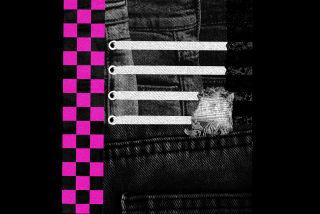Epithet or Everyday Word? ‘Boston Public’ Enters the Fray
- Share via
A love-hate relationship exists between African American actor Chi McBride and the N-word, the vilest epithet for his race. “I go through periods in my life where I use the word, and I go though periods in life where I swear the word off completely,” says McBride, 40, who grew up on Chicago’s West Side.
“But I always feel the exact same way about white people using the word. And that is, that word has too much power.”
Now “that word” will be a major story line on McBride’s sometimes-controversial Fox high school drama, “Boston Public,” created by David E. Kelley. Scheduled for 8 p.m. Monday, the episode looks at how some black youths freely use the word not only among themselves as a term of endearment, but also with some of their white friends--and vice versa.
In Monday’s episode, a black student and a white student at Winslow High School toss the word back and forth, which starts a fight with an offended black kid.
Wanting to defuse the situation, the teens’ white teacher, Danny Hanson (Michael Rapaport), leads his class in a discussion of the word, including its use by rap artists and comics, and as the subject of a book by Harvard Law School professor Randall Kennedy. Its very utterance, especially by whites, causes black teacher Marla Hendricks (Loretta Devine) to lobby principal Steven Harper (McBride) for Hanson’s removal.
“That word has always stood for hatred coming out of a white mouth,” she says in the episode. “No teacher in any school is good enough to erase that in a sensitivity class.”
The epithet’s potency caused “Boston Public’s” writers, including Kelley, to want to write about it. “It’s a sensitive topic, that goes without saying,” says co-executive producer John J. Sakmar, who wrote the episode with Kelley, Kerry Lenhart and Sean Whitesell.
Says Lenhart: “That’s something that needs to be addressed in the episode, that the word hasn’t lost its power just because so many people have gotten used to hearing it very casually.”
This isn’t the first time the word has been examined by series television. Lifetime’s “Any Day Now” and UPN’s “Girlfriends” have dealt with the consequences of its use.
Lenhart and Sakmar say the episode, for which Kelley consulted Harvard’s Kennedy, isn’t out to solve the problem. It’s designed to foster “healthy, positive discussion,” Sakmar says.
“I think that television and movies, at best, will strike people to have conversations, but I don’t think television and movies are going to change things that much,” says Rapaport, who has appeared in such racially charged movies as “Higher Learning,” “Zebrahead” and “Bamboozled.”
Mitsy Wilson, senior vice president of diversity development for Fox Entertainment Group, says she “let out a major sigh” when she heard about the episode. As an African American, she “was a little puzzled and concerned” at this topic coming up during Black History Month. However, “given the opportunity to read the script and have some input with broadcast standards, and then to actually look at the entire episode in terms of what we were trying to do, I think it’s a responsible piece of television,” Wilson says.
Naturally, there are those who disagree. That isn’t much of a surprise for “Boston Public,” the target of a coalition of 15 family and child advocacy groups who have complained to the Federal Communications Commission that the series is too incendiary for the first hour of prime time.
Cultural critic Darrell Mottley Newton of the University of Wisconsin-Whitewater cites a concept in cultural studies called “packing,” in which “certain notions are ‘packed’ within the use of a word. If one were to say ‘sex,’ certain images and notions are inescapable.”
But “despite the reclassification and countercultural usage” of the word, Newton says, “its horror and blight upon our imagery, and more important, self-image as black folk, are still there.”
Psychiatrist Alvin Poussaint of Harvard Medical School was a onetime consultant for NBC’s “The Cosby Show” and sees an even deeper meaning.
“How does that affect a black kid age 10 watching ‘Boston Public’ and listening to that discussion?” he asks. “The context of the word is so demeaning and has all of the connotations of a lowlife, inferior being.”
The episode doesn’t suggest solutions, but McBride has one: “The only thing that’s going to make some people happy is everybody stop using the word right now. OK, that lasted a couple of seconds. What next?”
*
Allan Johnson covers television for the Chicago Tribune, a Tribune company.
More to Read
The complete guide to home viewing
Get Screen Gab for everything about the TV shows and streaming movies everyone’s talking about.
You may occasionally receive promotional content from the Los Angeles Times.






